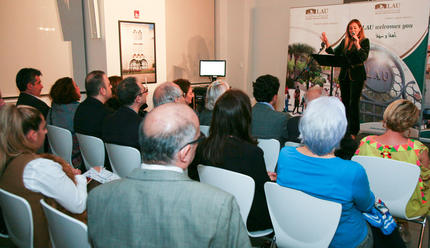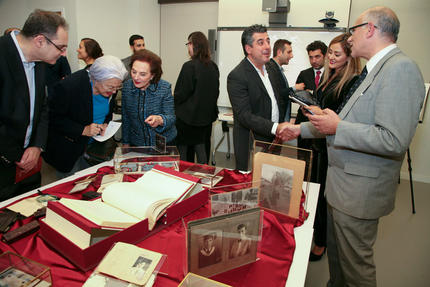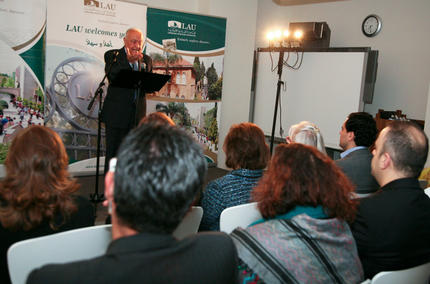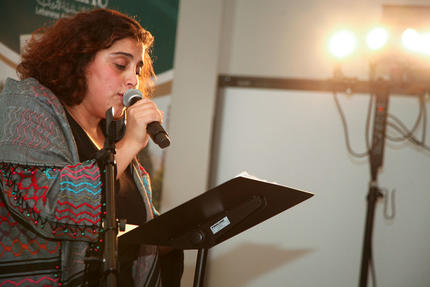Commemorating a visionary
LAU NY honors Lebanese poet and humanist Jawdat R. Haydar whose poignant verse about Lebanon, peace and tolerance has inspired many lives.
On October 12, LAU NY, in partnership with the Consulate General of Lebanon and the New Pen League, hosted a commemoration of Lebanese poet Jawdat R. Haydar, offering a glimpse of his legacy through a documentary film, readings, and an exhibit featuring artifacts from his life.
Haydar not only lived until 101, but produced some of his most brilliant and profound work toward the end of his life.
Born in Baalbeck in 1905, Haydar’s childhood was filled with strife. His father and siblings were forced into exile in Turkey under the Ottoman Empire. At nine, he was left alone with his mother, who was stricken with Typhus and died, after which he made the long and harrowing trip to Turkey to join his family. His life journey took him to France, and then to the U.S., where at age 16, he wrote his first poem as a student at North Texas University.
While Haydar went on to have a career outside of poetry, first as an educator at the Universal College in Aley and the Najah National School in Nablus, and later as a director at the Iraq Petroleum Company and the Mid-East Auto and Trading Company, the poet was always inside him. After his retirement in 1960, he went on to publish four books of poetry: Voices, Echoes, Shadows, and 101 Selected Poems.
“He was a visionary. He wrote about universal issues like science and the beauty of nature, and focused on themes of non-violence, tolerance, and human rights,” said his daughter Shahina Osseiran, who attended the event along with several other members of his family.
“He hated pollution, not just environmental pollution, but pollution in the minds of and hearts of people.”
The evening began with readings of Haydar’s poems by alumna Hilda Abla, and New Pen League member Rita Zihenni. “When I read his poetry, I was blown away,” said Abla. “I felt like he was talking to me. And when I read To Be Yourself, it was like he was me, talking to myself. The poems were very personal and they touched me deeply.”
Indeed, his work touched many lives, earning him recognition from the Lebanese Order of the Cedar, the Golden Medal of Lebanese Merit, the French Legion of Honor, and the Papal Medal from Pope John XXIII for humanitarian work.
“Jawdat Haydar contributed to building bridges of understanding,” said Lina Beydoun, executive director of the New York Academic Center. “His life was filled with integrity, humility, philanthropy, and humanitarianism.”
It is for these reasons that Haydar is often remembered not just as a poet, but as a humanist. “While his poetry reveals a deep attachment to Lebanon, its landscape, and its people, he was also a man who moved across the world and saw things from a larger perspective,” said Consul General of Lebanon Majdi Ramadan. “Haydar rejected the divisions of religion, language or ethnicity, and embraced a universal spirituality that encompasses humanity.”
The evening concluded with a reading in Arabic delivered by Youssef Abdel Samad, poet and managing editor of the New Pen League, a group that helps preserve the heritage of early immigrant poets such as Khalil Gibran, Mikhael Naimy, and Elia Abu Madi.
One of the first Arab poets to write original works in English, Haydar’s poem, “The Temple of Baalbeck,” was incorporated into the official curriculum of the Lebanese Baccalaureate.
In 2011, LAU inaugurated the Jawdat R. Haydar Memorial Study Room in the Riyad Nassar Library in Beirut, home to some of Haydar’s precious books, old manuscripts, and personal belongings donated by his family.
To read more of his work, visit jawdathaydar.org
More
Latest Stories
- LAU Nursing Camp Opens Eyes, Hearts and Futures
- Meet Dr. Zeina Khouri-Stevens, Executive Vice President for Health Services
- LAU Family Medicine Graduates to Benefit from a Partnership With Nova Scotia
- AKSOB Assistant Professor Shares Her Vision for the Future of Learning
- LAU Simulation Models Celebrate 20 Years of Learning, Leadership and Service
- The School of Engineering Hosts the Lebanese Electromagnetics Day
- LAU Stands Out on the Sustainability Scores
- Michael Haddad Walks Again for Climate Change and Food Security





